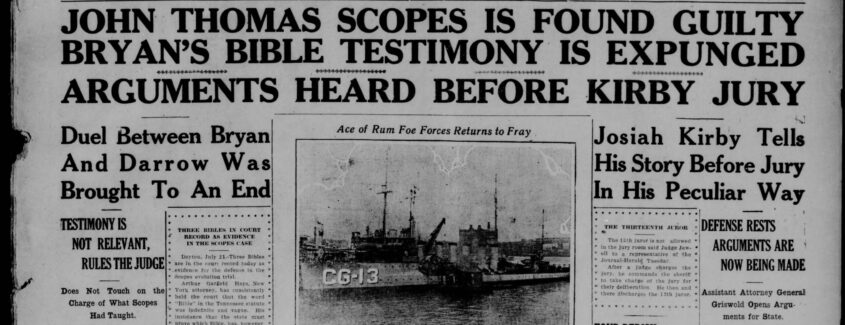
One hundred years ago this month, the United States and even the world turned its attention to Dayton, Tennessee, to witness a trial purported to be a showdown between modern science and backwards religion. Despite the widespread media coverage, or perhaps because of it, the Scopes Monkey Trial continues to be one of the most misunderstood cultural contests in American history.
In March 1925, the Butler Act—which forbade the teaching of specifically human evolution in Tennessee public schools—was signed into law. By July, the ACLU had already challenged the statute under the auspice of defending John T. Scopes. The trial represented a goldmine for the media as both sides put forth famed champions for battle. The “Attorney for the Damned” Clarence Darrow strode forth for the defense while “the Great Commoner” and three-time Democratic presidential nominee, William Jennings Bryan, stepped into the ring for the prosecution.
As is well known, Bryan, to the frustration of Fundamentalists then and now, ultimately did a poor job of defending Biblical literalism from Darrow’s derisive attacks. That fact, however, typically ends Americans’ accurate understanding of the trial. Bryan, after all, goes on to win the case with Scopes convicted and fined. The Butler Act will remain law until 1967. The jury had even missed Bryan’s infamous testimony because the frustrated judge had dismissed them during it since it held no bearing on Scopes’ guilt or innocence.
Though Bryan won the battle, he lost the war, as H.L. Mencken and hordes of media elite used the trial to savage the traditional beliefs of Americans. Today, most Americans’ understanding of the trial stems from these media accounts or most likely from either viewing the film Inherit the Wind (embarrassingly often in a classroom) or participating in a performance of the play (frequently and ironically at school). However, Jerome Lawrence and Robert Lee wrote the work to attack McCarthyism, not to provide a historically accurate portrayal of the trial.
Bryan’s poor performance stemmed from the fact that he himself did not believe in a literal six-day creation, begging the question as to why he was there in the first place. Bryan had taken to the airwaves and podiums to advocate for laws such as the Butler Act because he feared that the teaching of atheistic evolution, “takes from [students] every moral standard that the Bible gives us.” In contrast, Darrow’s team noted that Bryan was needlessly concerned as, “we have no fears about the young people of America.”
However, such was not the case for Darrow just a year earlier when he successfully circumvented the death penalty for infamous teenaged murderers Nathan Leopold and Richard Loeb. As part of his defense of 14-year-old Bobby Franks’ killers, Darrow had taken educators, librarians, and the citizens of Chicago to task for providing access to Friedrich Nietzsche and nihilistic philosophy that he said predictively undermined Leopold and Loeb’s moral compass and even determined their vile actions. Darrow fervently and persuasively argued that communities must take responsibility for what they teach their youth. However, a year later, when it served Darrow’s purpose, he scoffed at a public’s attempt to guard the moral education of their children.
The defense of Scopes would naturally include a defense of the textbook he used. However, the book, A Civic Biology by George William Hunter, endorsed several evolutionary theories now completely rejected by evolutionary biologists. More importantly, for those today, assuming they would have been on the side of “science,” Scopes’ textbook declared as scientific fact that five races existed on the earth at that time with, “the highest type of all, the Caucasians, represented by the civilized white inhabitants of Europe and America.”
The following year Hunter’s revised text “scientifically” declared many families to be parasites on society. He noted:
[If] such people were lower animals, we would probably kill them off to prevent them from spreading. Humanity will not allow this, but we do have the remedy of … preventing intermarriage and the possibilities of perpetuating such a low and degenerate race.
Indeed, “modern” and “scientific” progressives would two years later ensconce eugenics in America’s legal system through the Buck v. Bell decision with the infamous words of Oliver Wendell Holmes Jr. declaring that, “three generations of imbeciles are enough.”
Roughly 75 years after Scopes, Eric Harris terrorized the halls of Columbine High School wearing a shirt that read “Natural Selection.” Now 100 years later, for those wishing to cling to an account of the trial that dismisses Bryan and the Fundamentalists as Chicken-Little wackos, the current moral state of American public schools lends little credence to the claim.
In 1925, American teachers considered “flappers” wearing skirts to the knee and hair to the chin the vexing problems of young adulthood. In 2025, thousands of American children enter school through metal detectors, walk the halls with armed guards, are surrounded by every variety of mental disease, and daily encounter widespread drug, alcohol, and sexual abuse.
If hindsight is indeed 20/20, the 100-year anniversary of the Scopes Trial offers a poignant time to critically reflect on William Jennings Bryan’s warnings regarding the foundations of morality, our nation’s subsequent history of establishing secular atheism as the country’s official religion, and the marginalizing of parents’ authority in determining their children’s curriculum.

